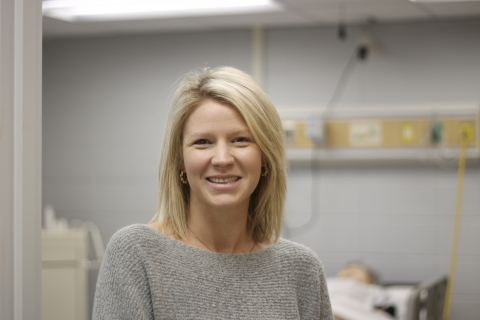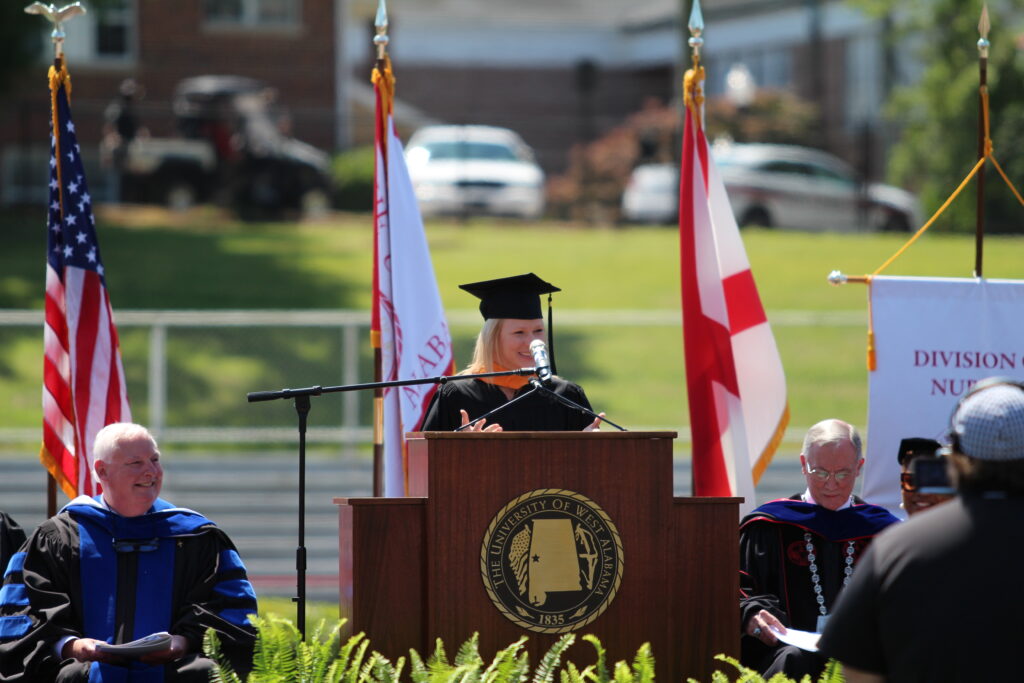
Story: Phillip Tutor | Photos: Betsy Compton
Former neonatal ICU nurse has jumped at chance to expand her UWA role
Nursing seeped into Kelly McClure’s world not by accident or epiphany, but via something just as effective.
Youthful curiosity, fleeting as it often is, won out.
“I obviously loved helping people, but what really interested me were all the medical shows,” said McClure, an assistant professor of nursing at the University of West Alabama. “I found the human body and the way it worked very interesting to me. I liked classes like biology in high school. It felt like it confirmed that this is what I wanted to do.”
Today, McClure teaches in UWA’s Ira D. Pruitt Division of Nursing, works closely with the division’s upper-level students and serves as director of the Project EARN (Educating Alabama Rural Nurses) scholarship program. Last spring, UWA honored McClure with the 2021 William E. Gilbert Award, which recognizes excellence in undergraduate classroom instruction. Accolades aside, it’s quite a change from her time as a young nurse in the neonatal intensive care unit at DCH Regional Medical Center in Tuscaloosa.
But no chapter of McClure’s career story — the TV shows she watched as a child, the classes in high school, the youthful curiosity — may overshadow the influence wielded by her aunt, nurse Donna Pope, the chief nursing officer at Whitfield Regional Hospital in Demopolis.
“I would hear her tell stories of her work,” she said. “You could tell she was passionate about it. I liked that she demonstrated passion for what she did. I liked hearing her tell stories of what she did. It definitely planted a seed for becoming a nurse and caring for children.”
McClure’s path to UWA is rooted in western Alabama bonafides and marked by the hour-long commute between Livingston and Tuscaloosa. Born in Meridian, Mississippi, and raised in Demopolis, McClure graduated from Auburn University in 2008 but migrated west to work at DCH. A year later she married her husband, Keith McClure, who operates a large farm in north Sumter County that grows hay, wheat and soybeans. Then life turned hectic.

In 2013, she took a second job teaching clinical rotations for UWA nursing students. Wanting a master’s degree, she enrolled in the online program at the University of Alabama and still managed to moonlight in UWA’s skills lab. Hers was a manic schedule of a wife, mother, nurse and adjunct educator, driving the repetitive miles each day between UWA’s campus, her Sumter County farm and DCH in Tuscaloosa.
The possibility of lessening that workload, not to mention the stress of night-shift work in the neonatal ICU, proved a godsend. Already familiar with McClure’s work, UWA in 2017 offered a faculty position. Her answer was essentially automatic.
“When there were opportunities to expand my role at UWA, I jumped at the chance,” she said.
But that transition wasn’t stress-free. The year before and while 32 weeks pregnant with twin boys, McClure broke her neck in a car accident while driving home after a night shift at DCH. Now recovered, she hasn’t worked a nursing shift since that night. Other obligations have taken precedence.
“I do miss it, but it’s just that being a professor and teaching nursing fits so well with my family right now,” she said. “I do miss the babies, I do miss that, and I do miss the friendships I made (at DCH) because I worked there for about nine years before I came here. But I am so happy, and I found that I love teaching.”
At UWA, McClure works closely with upper-level nursing students who are nearing graduation. She and another instructor handle one of the upper-level courses, Advanced Adult and Critical Care nursing, and she coordinates the preceptorships that provide students with one-on-one, on-the-job training alongside experienced nurses.
After students graduate, McClure is among the UWA faculty members who shepherd the soon-to-be nurses toward the National Council Licensure Examination, or NCLEX, that allows them to begin their careers.
“I have found that this feels like home. I love the environment. UWA has been a great employer, my coworkers are awesome to work with, and for my family situation it has just worked out really well with having young children and living in a rural area.”
— Kelly McClure
UWA’s spring 2021 nursing graduates posted a 100 percent NCLEX graduation rate, well above the national average.
“I love this point (in students’ lives),” McClure said. “Of course, they’re tired. It’s hard, but they’re also excited. They’re so close to being done. You can see them realize that it’s about to happen. I like that aspect of it.”
Unable to quickly enter a doctoral program because of family commitments, McClure told Dr. Mary Hanks, chair of the Division of Nursing, several years ago that she nevertheless wanted to “make a difference” in Livingston. “Do you have any thoughts on that?” McClure asked.
Hanks wondered if McClure was willing to write a grant proposal for what would become Project EARN. That management skill wasn’t on McClure’s resume. But she said yes — and it worked. UWA received a $2.4 million federal grant to provide nursing scholarships for the next five years, and it offered an opportunity to nudge her career into administrative roles.
Thus far, 88 UWA students have received Project EARN scholarships.
“They’re able to graduate and not have the student loans attached to that,” McClure said. “They’re able to focus on school versus spending time working. This program is so fast-paced, it’s challenging, and for our students that makes a big difference to not have to spend as much time working outside of school.”
In a sense, overseeing that scholarship program has returned McClure to the days where she multitasked at multiple jobs. “It has been a learning curve,” she said. “It has taken some time to get used to, but I think it’s important work because it’s helping and making a difference for so many students who have come through.”
On the farm, the McClures’ four children — all boys, ages 11 to 2 — are now old enough for their mom to finally seek her Ph.D. In August, she enrolled in a blended doctoral program at William Carey University in Hattiesburg, Mississippi, whose online schedule is compatible with hers, both at home and at UWA.
“I have found that this feels like home,” she said. “I love the environment. UWA has been a great employer, my coworkers are awesome to work with, and for my family situation it has just worked out really well with having young children and living in a rural area.”